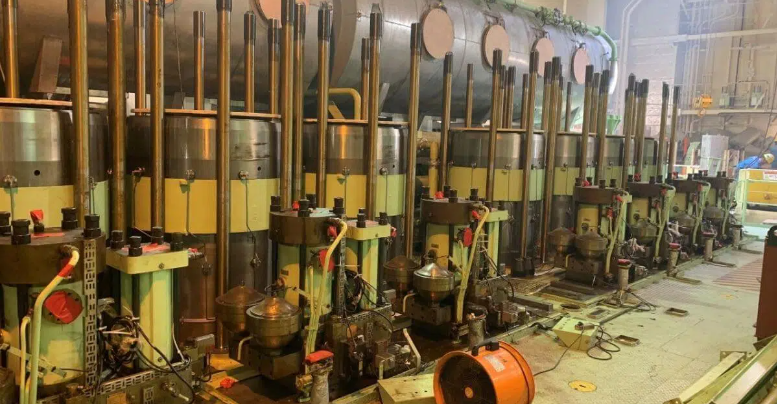The Maersk Halifax, a 15,000 TEU Very Large Container Vessel (VLCV) has become the world’s first ship to undergo a successful engine retrofit for green methanol operation.
The project, carried out by MAN PrimeServ, the after-sales division of MAN Energy Solutions, enables the vessel to reduce its CO2 emissions by up to 90%.
The retrofit involved upgrading the vessel’s original MAN B&W 8G95ME-C9.5 engine to a dual-fuel MAN B&W 8G95ME-LGIM Mk10.5 unit.
The process also included extensive modifications, such as the installation of new fuel tanks, a fuel preparation room, and a fuel supply system. Additionally, the ship’s hull was extended by 15 meters, increasing its cargo capacity to 15,690 TEU.
The ship’s engine control system was updated to MAN Energy Solutions’ Triton system, ensuring efficient dual-fuel operation.
After completing extensive sea trials, the Halifax returned to operation and is now servicing A.P. Moller-Maersk’s Trans-Pacific trade route.
This groundbreaking retrofit is expected to serve as a blueprint for similar projects. Maersk has already pre-ordered engine conversions for 10 more vessels as part of its strategy to achieve net zero emissions by 2040.
Leonardo Sonzio, Head of Fleet Management and Technology at Maersk, discussed the importance of retrofitting as an alternative to building new vessels, stating that learnings from this project will guide future upgrades.
Michael Petersen, Senior Vice President at MAN PrimeServ Denmark, said that retrofitting allows shipowners to drastically cut emissions without commissioning newbuilds.
He estimated that over 4,000 marine engines worldwide could be converted to operate on green fuels like e-methanol, presenting a scalable solution for the industry’s transition to cleaner energy.
The retrofit was completed at the Zhoushan Xinya Shipyard in China, taking 88 days. Sarath Prasannan, Senior Vice President and Head of Region Asia Pacific at MAN Energy Solutions praised the collaborative effort between Maersk, MAN Energy Solutions, and the shipyard at a ceremony marking the project’s completion.
This groundbreaking retrofit is expected to serve as a blueprint for similar projects. Maersk has already pre-ordered engine conversions for 10 more vessels as part of its strategy to achieve net zero emissions by 2040.
Leonardo Sonzio, Head of Fleet Management and Technology at Maersk, discussed the importance of retrofitting as an alternative to building new vessels, stating that learnings from this project will guide future upgrades.
Michael Petersen, Senior Vice President at MAN PrimeServ Denmark, said that retrofitting allows shipowners to drastically cut emissions without commissioning newbuilds.
He estimated that over 4,000 marine engines worldwide could be converted to operate on green fuels like e-methanol, presenting a scalable solution for the industry’s transition to cleaner energy.
The retrofit was completed at the Zhoushan Xinya Shipyard in China, taking 88 days. Sarath Prasannan, Senior Vice President and Head of Region Asia Pacific at MAN Energy Solutions praised the collaborative effort between Maersk, MAN Energy Solutions, and the shipyard at a ceremony marking the project’s completion.
Prasannan called the project a pivotal moment. He also expressed hope that China’s policies and infrastructure would continue to foster an environment that supports further innovation and large-scale retrofitting projects.
Prasannan called the project a pivotal moment. He also expressed hope that China’s policies and infrastructure would continue to foster an environment that supports further innovation and large-scale retrofitting projects.


